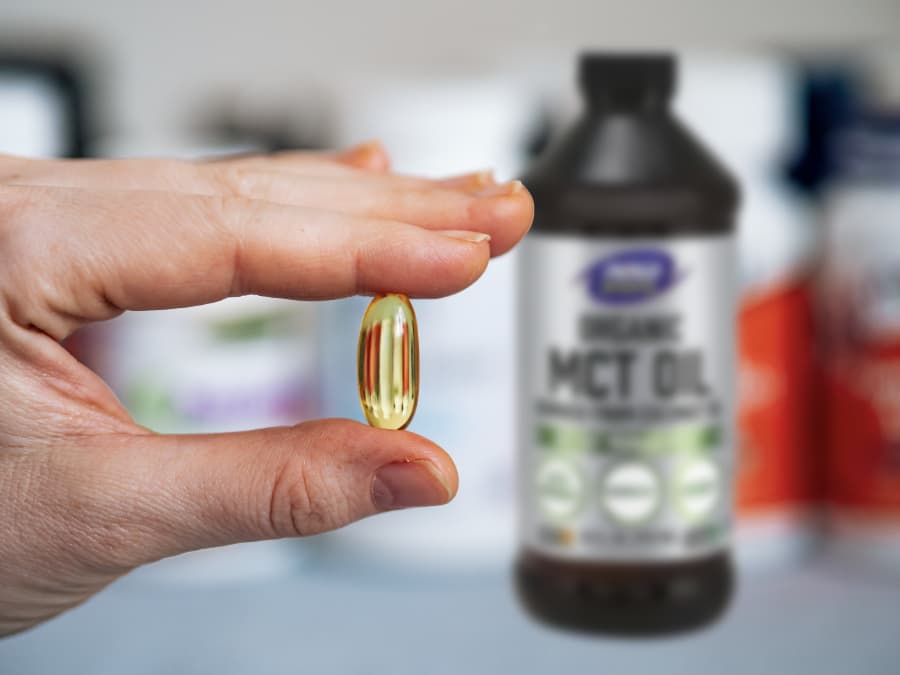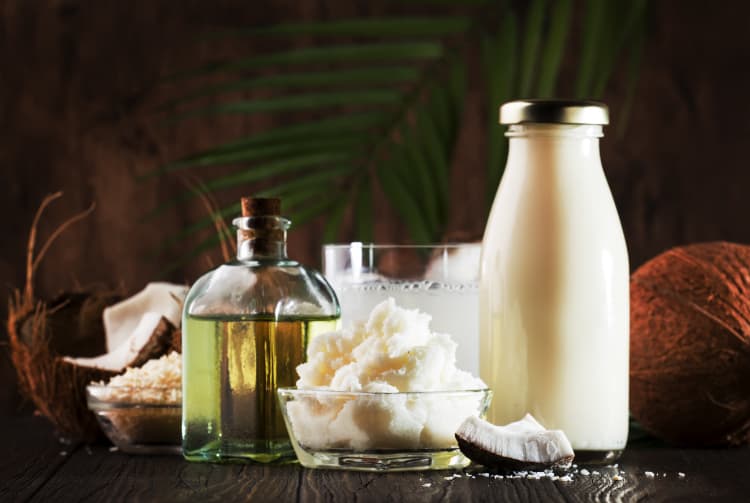
MCT oil is all the rage in the keto and low-carb community. But if you’re thinking about swallowing spoonfuls of MCT oil, certified nutritional therapist and founder of ChefV.com, Veronica Wheat, has a warning…
Imagine eating all the ice cream you want and never getting fat. (Or at least fatter.)
Sounds like heaven, right?
Well, MCT oil is that fairytale fat. That’s because it doesn’t get stored as body fat?
And there’s even more incredible selling points about MCT oil. With promises of fast weight loss, boundless energy, faster exercise recovery, lower inflammation and enhanced cognitive function, it’s no wonder MCT oil has become popular over the last few years. Especially in the keto diet and low-carb community.
Without doubt, MCT oil may be extremely beneficial for some people. But for others, could it be a ticking time bomb?
In this article, I’ll cover the basics of MCT oil plus I’ll list some of the surprising reasons it could potentially backfire on your health. I don’t mean to scare you, if you’ve been using MCT oil for some time. Just consider the following info food for thought…
MCT Oil & Coconut Oil
If you’ve been following my recipes over the years, you know I should have started my own coconut oil company. I use a ton of coconut oil and love it so much I even named my dog Coconut. Years ago, long before I was carrying a baby in my belly which I’m blissfully doing now (nausea excluded), I traveled to Bali and Thailand, where I took cooking courses. When I got back one of the first things I did when I got home was hit Costco and fill my trunk up with coconut oil so I could recreate all those scrumptious Southeast Asian dishes.
Coconut oil makes many cardiologists squirm. That’s because it’s made up of about 90% saturated fats. Saturated fat has long been considered the Dr. Evil of nutrition.
But here’s the thing. Unlike red meat and other animal products, all of which have a ton of saturated fat, coconut oil contains a special kind of fat. Hello, MCT.

What is MCT Oil?
MCT stands for medium-chain-triglycerides. Over 50% of the fat in coconut oil is MCT fatty acids. (Fatty acids are the building blocks of fat, just like amino acids are the building blocks of protein.)
Now, I hope I don’t put you to sleep with a boring biochemistry lesson. So I’ll keep this simple. Basically, the fat you eat in animal products consists of long-chain fatty acids. (Snoring yet?) Long chain fatty acids get stored as body fat unless you’re running a marathon.
But the neat thing about MCT fatty acids is that they don’t get digested in your small intestine. Instead, they get processed in the liver. To your body, MCT is like a Starbucks venti latte. It’s a quick burst of fuel for your body, especially your brain.
Rather than eating a huge bowl of pasta to fuel up for a workout (that’s the old-school way), you can use MCT oil for sustained energy. That’s why MCT oil has become popular in functional coffee drinks.
Unfortunately, your brain can’t rely on caffeine for fuel. But it can use MCT oil for energy. That’s because MCT oil is an external source of ketone bodies.
When you keep carbohydrates low, your body and brain can use ketone fatty acids (also called ‘ketones’ or ‘ketone bodies’) for energy.
Remember: sources of ketones like MCT oil, for the most part, don’t get stored as fat. This is what leads to rapid weight loss and the other possible health benefits of the ketogenic diet such as a reduced risk of developing neurodegenerative diseases like Alzheimer’s.
(Fun fact: There are four main types of fatty acids in MCT oil: caproic, caprylic, capric and lauric acid. Coconut oil is abundant in lauric acid.)
All great stuff. But before you load up on MCT oil there are some things that may lead you to reconsider.
Reason #1 MCT Oil Might Be Overrated: It’s Not Natural
While medium chain fatty acids like lauric acid in coconut oil are 100% natural, MCT oil is not. (In nature, MCTs are also derived from palm kernels.)
MCT oil hasn’t been around for that long, all things considered. In fact, the National Institutes of Health says that MCTs were first extracted in the 1950s. The first MCT oil product wouldn’t be introduced to the market until decades later (thanks to the Bulletproof Coffee craze).
The truth is that MCT oil is an industrial product. It’s not a naturally-expressed oil. Naturally-expressed oils don’t need heat or chemicals to be extracted. But many MCT oils you see on supermarket shelves require harsh chemicals and solvents to extract the oil from the coconuts and palm kernels.
Chemicals that I don’t want my baby exposed to such as hexane are used in the extraction of MCT oil. Not only that, some manufacturers use corn oil to make MCT oil. Corn is one of the most highly-inflammatory oils.
The difference between many store-bought MCT oils and expeller-pressed olive oil is like the difference between Chef V Organic Green Drink and name-brand juices. Chef V’s is made fresh without the use of high-heat pasteurization (HHP), which basically kills most of the nutritional value. Big name juices? Yup, they’re making a killing by killing the nutrients via HHP. But I digress.
Honestly, I don’t know what the long-term effects of MCT oil are. And I don’t think anybody does. Even though it’s been shown to speed up the weight loss process if you ditch most of your carbs, I’d still take it easy on it.

MCT Oil Warning #2: Detox Danger
Very few people have problems digesting coconut oil even though it’s loaded with saturated fat. But if you dive in the deep end with MCT oil it could clog up your liver. Remember I said that it’s your liver that mostly processes MCT oil instead of your digestive organs? Well, let’s say your liver is sluggish to begin with.
—–> Need to DETOX your liver? Start here
If you consume too much MCT oil, your liver may freak out and send the contents back into the digestive system. If this happens you may find yourself running to the bathroom with loose stools.
And more seriously than diarrhea, anybody with any liver problems should absolutely stay away from MCT oil.
MCT OIL Warning #3: A Heart Attack In The Making?
Does the high saturated fat content of MCT oil pose a risk for heart disease? Honestly, most studies on MCT oil say it’s not really a big risk. For instance, a review of several studies in the Journal of Nutrition concluded:
“MCT oil does not affect total cholesterol, LDL cholesterol, or HDL cholesterol levels, but does cause a small increase in triglycerides.”
Higher triglycerides, which are fats in the blood, is not good. But overall, not a huge problem.
Unless…
…You’re someone who carries a genetic mutation called APOE4.
The APOE4 gene is associated with an increased risk of cardiovascular and neurodegenerative disease such as Alzheimer’s. Roughly 20% of people carry a copy of this gene. And 2% to 5% carry 2 copies. Even if you only have one copy, your risk of developing Alzheimer’s doubles, says research from Stanford University. If you have 2 copies, well, let’s just say you should put down the jar of MCT oil right away!
Again, not to scare the bejeezus out of you. But it’s interesting that one of the biggest supposed health benefits of MCT oil is that it can prevent brain disorders.
However, it’s possible that for some people with a mutation of the APOE4 gene, consuming MCT oil could contribute to heart disease. Or Alzheimer’s.
Getting lab work done is the only way to know for sure if you have this genetic mutation. I say that’s worth splurging for if you plan on using MCT oil.
Having certain variations in the APOE4 gene can mean your body doesn’t do a good job of clearing cholesterol from the blood. MCT oil could potentially lead to a heart attack or stroke
According to a website dedicated to all things APOE4, if you have this genetic mutation, stick with a high-quality caprylic oil. (Also called C8 oil). This is because it doesn’t impact cholesterol in the blood as much.

MCT Oil Warning #4: Avoid When Baby Is On Board
In researching this topic, I stuffed my MCT oil in the back of the pantry. That’s because I read that it might not be safe for expecting or breastfeeding moms. It isn’t advisable for people with essential fatty acid deficiency.
Reason To Avoid MCT Oil #5: Insulin Resistance
I’ll probably get a lot of heat for this one, so let me just say I totally admit that this next warning is controversial. You see, there’s so many non-scientific articles that claim that MCT oil is great for people living with diabetes because it can help regulate blood sugar levels.
But the thing is there are some studies that suggest that MCT oil can actually induce insulin resistance. This means that the body has to release more insulin to remove sugar from the blood and drive it into the cells. Now, the study I linked to was a tiny one. So take this with a grain of salt.
The important takeaway is that if you have diabetes you should speak with your doctor before going hardcore Keto and using MCT oil.
Conclusion
No doubt there are thousands of people who have gotten leaner and feel great thanks to using MCT oil. MCT oil is an external source of ketone fatty acids that your brain and body can burn for energy instead of carbs (sugar). Your body doesn’t process or store MCTs like it does other fatty acids. That’s why it’s a special type of fat that’s become a godsend for low-carb dieters.
But as the saying goes, one man’s food is another man’s poison. Whether MCT oil is medicine or poison for you largely depends on your genetics. Before you start using lots of MCT oil, get some lab work done to see if your genes (and skinny jeans) will benefit from it.
Finally, don’t use MCT oil to cook with. It’s got a low smoke point and spoils more easily. Also, if MCT oil causes your belly to rumble, try using MCT powder.


